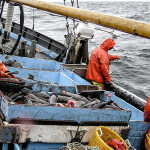Two weeks ago, things got ugly between the Alaska Salmon Processors Association (ASPA) and a collection of salmon processors trying to get back into the Marine Stewardship Council (MSC)’s certification program. The developments are not surprising, but they serve as a disturbing sign of a personal-trumping-professional history repeating itself. As of this writing it’s largely up to ASPA to stop the cycle before things really get out of hand, but the association’s most recent correspondence on the matter does not inspire hope.
The application to re-join ASPA’s MSC certificate came in April from eight companies – Trident Seafood, Peter Pan Seafoods, Icicle Seafoods, Ocean Beauty Seafoods, Kwik’pak Fisheries, North Pacific Seafoods, Alaska General Seafoods and Leader Creek Fisheries – that withdrew from the MSC in 2012. At the time, the withdrawals accompanied various critics’ concerns about the MSC program, but the companies are now coming back after hearing predictions of a bumper-crop of salmon this year, which they’ll need the MSC’s eco-label to sell.
But the simplest way to do that would be for ASPA to allow the companies to join its client group, despite a rocky history between the companies and the MSC/ASPA ever since their 2012 withdrawal. A serious roadblock went up for the processors recently when Rob Zuanich, ASPA’s executive director, in a scathing letter to Stefanie Moreland at Trident, the de facto spokesman for the applicants, flatly rejected the application.
In a critique that stretched to seven pages, it was clear neither Zuanich nor ASPA were willing to let bygones be bygones. The letter to Moreland began by ticking off points of history of the MSC fisheries client. Zuanich started with the withdrawal of the companies and the subsequent Purse Seine Vessel Owners Association (PSVOA) pulling out as the certificate holder “under heavy pressure from the companies you now represent.”
He went on to blame the companies for forcing a lapse of MSC certification for Alaska salmon altogether in 2012, and mentioned how that was a hardship for ASPA members.
He also took aim at the Alaska Seafood Marketing Institute (ASMI), citing a 2012 letter where ASMI wrote, “the action to withdraw from the MSC salmon scheme is in the best interest of the Alaska salmon industry, an industry in which [they] have invested heavily for the future of Alaska, our fishermen, their families and our companies.”
The history Zuanich tells, while no doubt factually accurate in places, is colored with the perspective that ASPA has persevered as the current MSC certificate holder despite persecution and victimization from pretty much everybody. Zuanich even accused an industry media site – not SeafoodSource – of being a part of ASMI’s lambasting of ASPA and the MSC.
No one is more of a villain in ASPA’s tale, however, than Moreland and the companies she represents. While Zuanich finishes the letter by saying his questioning of the processors’ long-term commitment to the MSC is the principal reason for rejecting the application, it’s impossible to get to the bottom of Zuanich’s list of dirty laundry without concluding the rejection is, in part, personal.
It’s hard to blame Zuanich for being a little bitter. Moreland, in a public statement responding to the letter, referred to Zuanich’s comments as “allegations,” but even if as many as half of Zuanich’s claims are exaggerated or flat-out wrong, there’s still enough room there to understand fully why ASPA is upset. While Moreland and the processors believe they are fulfilling what the MSC officially requires for readmission, it’s clearly not enough to satisfy Zuanich and ASPA, and perhaps rightly so.
Still, if Zuanich and ASPA want to look at history as justification for their actions, they might at the same time consider that standing up for something, while honorable, is partly why Trident et al are in this position in the first place, starting back in 2012 when the processors first jumped ship on the MSC. While media reports at the time didn’t have a lot of direct statements from the processors as to why, many others, from ASMI to then-Alaska Gov. Sean Parnell, railed against the MSC and praised the processors for sticking to their principles.
As ASPA would gladly point out, now the processors are being forced to eat crow and come crawling back, despite their principles. So now ASPA is in a rare position of strength and wants the processors to sweat a little, citing principles of its own. That’s fine, but ASPA should expect to let them back into the fold eventually, and not to wait too long. Moreland and the processors appealed to the MSC’s board of trustees, which has come back with an offer to mediate the dispute. In a related twist, Alaska Gov. Bill Walker has also written the MSC appealing for the nonprofit to do more to help resolve the dispute.
If that doesn’t work, a spokesman for the MSC confirmed there’s an outside chance that these processors, which even Zuanich admits are “major” compared to ASPA members, could apply for, and get, their own MSC client group. The MSC has said it would prefer not to have multiple certificate holders, and while even the abbreviated process, as spelled out by the MSC, would take long enough to make such a prospect an extreme long shot, it’s still possible.
If that happens, ASPA won’t be the only certificate holder in town anymore, and will very quickly go from top dog possessing the potential to be the bigger grownup and share the wealth to being nothing more than a marginal player, and for that they’ll have nothing but themselves to blame.





